3 Reasons You Don't Want a Tax Refund

What does this year’s tax bill look like for you?
Do you owe money, or are you getting a fat check back from Uncle Sam? If the latter (75% of Americans are), before you release the balloons and throw the confetti, it might interest you to know that a giant refund isn’t cause for celebration. (What’s that, you say? Why wouldn’t I want a pile of cash with my name on it?)
Read on to find out why, what you could be doing with the money instead, and why you might want to prevent yourself from getting a refund next year. (Don’t worry, we’ll show you how.)
Why You Don’t Want a Big Tax Refund
The simple reason you don’t want a refund is that getting one means that you’ve just loaned the U.S. government your money—without making interest on the loan.
It’s not the smartest financial plan, especially if you’re lugging around credit card debt, student loans or a negative balance of any kind. Instead of loaning that money to the government, you could be making that money work for you—and earning interest on it at the same time, says LearnVest Planning Services certified financial planner ™ Lorrie Minor.
Here’s what you could be doing with your money if you had had it for that year. Let’s assume you had $2,800, the amount of the average refund in 2012.
1. You could save for retirement.
When you let the government sit on nearly $3,000 for up to 12 months, you’re giving up a huge opportunity for savings. What if, instead of waiting for the I.R.S. to refund you your overpayments each spring, you bumped up your 401(k) contributions by a percentage point or two (or more)? Over several decades of your working career, that change could earn you a more comfortable existence in your golden years. “There are ups and downs in the market,” says Jude Coard, a tax partner with Berdon LLP in New York City, “but if you’re a long-term investor and you don’t put that money in until you get your refund, you’re basically losing a year’s worth of appreciation on it.”
2. You could have an emergency fund.
That $2,800 is no small chunk of change. If you had an unexpected car expense or medical bill, you’d probably be really happy you had it. Emergency funds don’t spring up overnight—you have to put money aside, little by little. If you don’t have one, an extra $233 a month would help start to fill yours out. (Your goal is to have enough funds to tide you over for six months.)
3. You could pay down debt.
As mentioned, a refund of $2,800 is an extra $233 a month in greenbacks you could have had in your pocket—which you could have used to pay off debt or to have kept yourself from getting into debt. About half of U.S. households report carrying a credit card balance. “You could dedicate that extra money to paying down their balances, which could save you as much as 20% on that money,” Coard says. Even if you’re not paying that high of an interest rate on your plastic, the average credit card charges 13% to 15% in interest, so keeping your balance low (or nonexistent) is a good idea.
How to Fix the Problem
If you’re getting $200 back in April, there’s no need to go rushing to your benefits department to adjust your withholding. But if your refund is closer to $1,000 to $2,000, and especially if the amount is a relatively big percent of your income, you should consider making an adjustment. Your best bet: the I.R.S.’s withholding calculator. It requires some information, such as how much in taxes has been withheld so far this year, so you’ll probably want your most recent paycheck handy, as well as your most recent tax return. Once you find out what your withholding should be, you can file a new W-4 with your employer, sit back and wait for your fatter paycheck. (Find out how with our checklist: I Want to Fill Out My W-4 Withholding Form.)
But Wait a Minute …
This theory—that money in your pocket is better than money you’re loaning to the federal government—only works if you can exhibit some self-control. If extra cash every month is merely going to go toward eating out more often or buying yourself the next iPhone—what we call Lifestyle Choices, as opposed to Financial Priorities such as contributing to retirement or savings, or paying debt—then you’d be better off leaving well enough alone. “For some people, it really is a form of forced savings,” Minor says. “And a lot of people actually like getting tax refunds.”
If you do decide to take the high (paying) road, consider putting something in place to keep you from squandering your newfound funds. For instance, set up an automatic transfer every payday from your bank account to a savings, retirement or investment account, or to your student loan company. Or go ahead and boost your 401(k) contributions by an equivalent percentage. Your 65-year-old self will thank you later.
Read More From LearnVest:
Retirement, Savings or Debt? How to Prioritize Your Financial Goals
7 Reason You Need an Emergency Fund



















